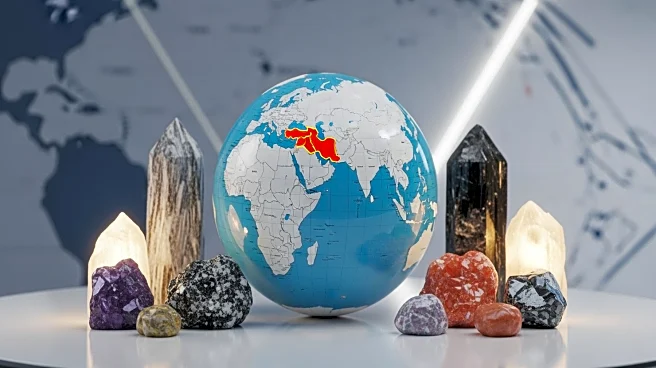What's Happening?
President Donald Trump hosted leaders from five Central Asian countries at the White House to discuss securing rare earth metals crucial for high-tech devices. The meeting included officials from Kazakhstan,
Kyrgyzstan, Tajikistan, Turkmenistan, and Uzbekistan. Trump emphasized the historical significance of the region, once part of the Silk Road, and criticized previous administrations for neglecting it. The discussions aimed to circumvent China's dominance in rare earth mining and processing, as China controls a significant portion of the global supply. Central Asia holds substantial reserves of rare earth minerals and uranium, essential for nuclear power production, but requires investment to develop these resources.
Why It's Important?
The meeting reflects the strategic importance of diversifying the U.S. supply chain for critical minerals, reducing dependency on China. Securing rare earth metals is vital for the production of smartphones, electric vehicles, and military equipment, impacting various industries. Strengthening ties with Central Asian countries could enhance U.S. economic security and geopolitical influence, especially as China and Russia exert power in the region. The initiative aligns with broader efforts to bolster American manufacturing and technological capabilities, potentially leading to increased investment and job creation.
What's Next?
The U.S. may pursue further agreements with Central Asian nations to expand trade and investment in critical minerals. Legislative efforts to repeal Soviet-era trade restrictions could facilitate American investment in the region, promoting economic growth and stability. The administration is likely to continue diplomatic engagements to secure mineral supplies and strengthen regional security partnerships. The potential inclusion of Kazakhstan in the Abraham Accords could further enhance diplomatic relations and economic cooperation.
Beyond the Headlines
The initiative highlights the geopolitical complexities of mineral resource management, as Central Asia navigates relationships with China and Russia. It underscores the ethical considerations of resource extraction and the need for sustainable development practices. The focus on rare earth metals reflects the growing importance of technological innovation and the role of critical minerals in shaping global economic and security landscapes.











